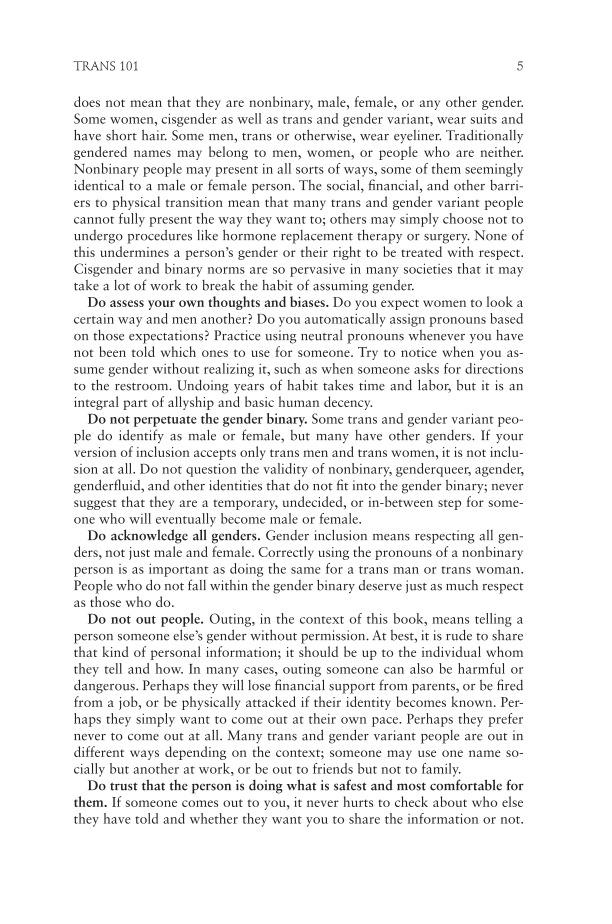Trans 101 5 does not mean that they are nonbinary, male, female, or any other gender. Some women, cisgender as well as trans and gender variant, wear suits and have short hair. Some men, trans or otherwise, wear eyeliner. Traditionally gendered names may belong to men, women, or people who are neither. Nonbinary people may present in all sorts of ways, some of them seemingly identical to a male or female person. The social, financial, and other barri- ers to physical transition mean that many trans and gender variant people cannot fully present the way they want to others may simply choose not to undergo procedures like hormone replacement therapy or surgery. None of this undermines a person’s gender or their right to be treated with respect. Cisgender and binary norms are so pervasive in many societies that it may take a lot of work to break the habit of assuming gender. Do assess your own thoughts and biases. Do you expect women to look a certain way and men another? Do you automatically assign pronouns based on those expectations? Practice using neutral pronouns whenever you have not been told which ones to use for someone. Try to notice when you as- sume gender without realizing it, such as when someone asks for directions to the restroom. Undoing years of habit takes time and labor, but it is an integral part of allyship and basic human decency. Do not perpetuate the gender binary. Some trans and gender variant peo- ple do identify as male or female, but many have other genders. If your version of inclusion accepts only trans men and trans women, it is not inclu- sion at all. Do not question the validity of nonbinary, genderqueer, agender, genderfluid, and other identities that do not fit into the gender binary never suggest that they are a temporary, undecided, or in-between step for some- one who will eventually become male or female. Do acknowledge all genders. Gender inclusion means respecting all gen- ders, not just male and female. Correctly using the pronouns of a nonbinary person is as important as doing the same for a trans man or trans woman. People who do not fall within the gender binary deserve just as much respect as those who do. Do not out people. Outing, in the context of this book, means telling a person someone else’s gender without permission. At best, it is rude to share that kind of personal information it should be up to the individual whom they tell and how. In many cases, outing someone can also be harmful or dangerous. Perhaps they will lose financial support from parents, or be fired from a job, or be physically attacked if their identity becomes known. Per- haps they simply want to come out at their own pace. Perhaps they prefer never to come out at all. Many trans and gender variant people are out in different ways depending on the context someone may use one name so- cially but another at work, or be out to friends but not to family. Do trust that the person is doing what is safest and most comfortable for them. If someone comes out to you, it never hurts to check about who else they have told and whether they want you to share the information or not.
Document Details My Account Print multiple pages
Print
You have printed 0 times in the last 24 hours.
Your print count will reset on at .
You may print 0 more time(s) before then.
You may print a maximum of 0 pages at a time.














































































































































































